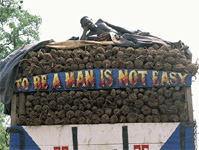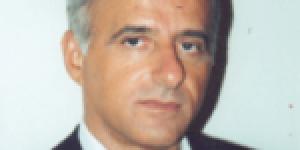To Be A Man Is Not Easy ~ Education, Solidarity And Being Able To Say No. Interview With Matthew Essieh
2 Comments Matt Essieh is my name, born in Sampa which is a village on the border with Ivory Coast. I loved school but had to stop at age twelve after completing middle school. My parents were very poor, even so that I had to live as an altar boy at the Catholic mission. My parent’s house was literally too small for all their children and you know that we Africans can improvise! So I grew up at the mission. After middle school I went across the border into Ivory Coast and stayed with an aunt. It was my own idea and the only way I knew to find money to further my education for which I have a passion. Yes so my plan was to do odd jobs and so raise enough money to support myself through secondary school. I decided on moving over the border into another country because in those days the economy over there was better. It was for example possible to earn money delivering loads at the local market with your wheel barrel and I also sold ice-cream with one of these bicycles with a cold box up front. I was willing to do everything. I cleaned tables in one of the hotels and many other ‘by-day’ jobs, whatever I could find.
Matt Essieh is my name, born in Sampa which is a village on the border with Ivory Coast. I loved school but had to stop at age twelve after completing middle school. My parents were very poor, even so that I had to live as an altar boy at the Catholic mission. My parent’s house was literally too small for all their children and you know that we Africans can improvise! So I grew up at the mission. After middle school I went across the border into Ivory Coast and stayed with an aunt. It was my own idea and the only way I knew to find money to further my education for which I have a passion. Yes so my plan was to do odd jobs and so raise enough money to support myself through secondary school. I decided on moving over the border into another country because in those days the economy over there was better. It was for example possible to earn money delivering loads at the local market with your wheel barrel and I also sold ice-cream with one of these bicycles with a cold box up front. I was willing to do everything. I cleaned tables in one of the hotels and many other ‘by-day’ jobs, whatever I could find.
This hotel had a restaurant where many of the Peace Corps volunteers used to come and have a drink after their work. The French language is hard for the Americans and I spoke English with them. Two Peace Corps volunteers took a special interest in me. They were maybe 21 years old and I was then 15. They really wanted to help me go through high school. So with the money I earned over these three years in Ivory Coast, and with their help, I found admission at secondary school in Brong Ahafo in Ghana. I was a little tiny skinny kid at that time so I looked as young as the other students. These volunteers helped me so much because they paid most of the tuition fees. I almost finished secondary school but during my last year one of the volunteers died. She had leukemia and died in Washington DC. I heard later that before this girl died she asked her parents to please look after ‘the boy in Ghana’. They then took such an interest in me that they helped me go to college in the States. I went to Oregon, Southern State Oregon University. When I left Ghana and entered college in The States I was probably 20 or 21.
Oregon is beautiful and quiet. It was the perfect place for me coming from a small rural town in Ghana. The atmosphere is nice that’s why I was specially grateful to be able to attend college over there on the West Coast. I graduated in computer business and then also got a Masters Degree in business studies.
Of course when you grow up here in Ghana you never forget your family. You feel strongly that you need to help your own country. So I studied hard and worked hard and was quite successful in both. I sought to get jobs which enabled me to best help my family in Ghana, like other Ghanaians do to their family.
My first job was at the computer department of a bank. I worked there for four or five years in software and accounting. In the meantime I had been in the States for over seven years and had never spoken my own language again. There was nobody from Ghana in my area and I felt cut off. I speak Twi. There were Nigerians and people from Sierra Leone but I did not get to speak my own language. There were no telephones, cell phones and all that in Ghana at that time.
So I really felt homesick and in 1985 returned for the first time to my country and my family. It took me a week to get the feel for my language again and that was a very strange experience. When I came back I saw my mother and my brothers and sisters, their young children and all the extended family. I wanted to help them all. It baffled me. I just had this little job which I was doing and how could I have enough money to support my family and extended family and the whole town?
So I went back to the States. I started thinking a lot about my obligation to help. I can only help if I have something! That inspired me to start my own business because working for somebody else limits you. In the USA, while I did not encounter racism, it was still hard to break into the system as somebody from the outside, particularly as an African. I decided therefore to start my own software consulting business. In the computer and software field there is a market and when you know what you are doing color does not play a role anymore. Besides computer science is really my branch.
I created my own website for the company and soon received clients from all over the world. From the Netherlands and England and of course from inside the USA. From many other countries as well, so much so that I was baffled by my own success.
I provide software for financial institutions. We now have our own building, a large facility in Portland, and we support several customers in Chicago and in the New York area and even in the Southern part of the country. I am the primary owner and have a large staff of employees and engineers. The business is important but more important is what I do with the funds. I had started my business with the sole aim to help my people in Ghana. There was a reason for this business beyond just becoming successful. Eventually I decided to set up a foundation with my family. My wife is a beautiful lady from Nigeria and I also have three kids. My son is now 17 years old. He is also here in Ghana at the moment, spending his summer vacation in Sampa.
So I have set up a non-for-profit foundation with the profits of the company. I use it for example to support our kids from Sampa in their education, and also to help children of Ghanaians who come to the States. I make it a point to see that they get quality education instead of just doing day to day jobs here and there. Good education sets them off right in life and gives them a foundation to prosper. Right now we’re supporting one youngster who just completed his Bachelor’s degree. He is working at Intel. Another is in Canada where he just received a Masters degree and we are also helping two other students. So I primarily assist young talented Ghanaians with good education and if they succeed in America they hopefully think about the people they left behind in Ghana.
At the minimum they will help their own family and hopefully more than that. We don’t expect from the Ghanaian kids in the USA that they repay their school-fees to our foundation but what we expect from them is that they study seriously, graduate, find a good job and help their homeland. Well right now they don’t pay us back, I may change that in the future.
Our foundation also helps with some projects in Sampa. We use some of the funds to help with medical supplies and do fundraising to construct a dormitory for girls at Sampa’s secondary school. That’s why I am in Ghana now, to see how the construction of the dormitory is going. It goes well. My son stays on to help while I have to return to the States.
You could say that I run a development agency for my town Sampa in Ghana and for good education of Ghanaian children in the States. That was the cause, the reason for starting my now well known software business. I have to say that always and always keeping that goal in mind was one of the reasons that I succeeded. To work just for money is sometimes empty. I make profit for a cause. There is a motive for the profit beyond myself and my family and I have seen that that is a satisfactory way of living in all kind of ways.
Of course there are difficulties in running a business, all kind of problems. It is however a fact that they change into light burdens if you know that the aim of it all is to help people! It gives the energy to go on when it becomes hard.
The problems in Africa can be so overwhelming that you just throw your hands in the air! However if you develop your talent well and you get friends and family to help, then you can do miracles for others even beyond your immediate family. That is what we emphasize in our foundation and to the students who we sponsor: ‘Have a heart for service to others!’
Well I’ve visited all the families of the kids in the States that we helped through their education. They have shown dedication to their family in Ghana so that side of the equation has happened. We have a fundraiser for this girl’s dormitory at Sampa and many have come to help, so at that level too it works. But it could work better still. What I am talking about, structural help, is more difficult because the outcome is a long term effect, you can’t see it immediately. Mostly our people want to help relatives, not an infrastructure for the village.
What we do therefore is select the students who we sponsor. We have to make decisions. It is very difficult to get an insight in people when they come for an interview. They come in, they have a name and they want education and pretend they are going to help. How to select the genuine and generous talents! So what I do is ask the community more information about the child and so get more of a background picture. There are people I believe in.
There are people I turn down because we have limited resources and we can’t waste them. My own money and even more importantly the money of the foundation can build a house for someone, things like that. I don’t do that, I want development at a larger scale. Yes I have built a house for my old mother of course but beyond that it stops and we work for the community. My wife is member of the foundation and my son will be part of it as soon as he is 21.
We have to get our own children involved. My wife is very supportive while she is not even from Sampa, my wife is from Lagos in Nigeria. Yet she went to Sampa and she helps the foundation with all her heart. We also raise funds at the school of my children. So the project is under way in Sampa and as far as getting my family involved and making them part of the process I am pleased. My son decided on his own to come to Ghana. He never made locks before and now he is making locks and works with his hands at the construction site and he is happy.
I have a 15 year old girl who likes what girls of that age like, so for her I have to be careful not to push it. I want to make them aware and then the choice is theirs. I have an 8 year old girl and she has a caring side.
My business has been in place for 17 years. We have never laid off people, we consider them as extended family. In 2000 when the economy and technology in the USA went down I kept my people. I told them: you can feed your family, pay your mortgages and pay your rent. We don’t lay you off. Because of this they are loyal; we have many employees who have worked over 10 years with me. Our employees are mostly Americans, mostly Anglo’s, also a few Koreans and some Africans. We have diversity and we are able to work together. Sometimes I am surprised with our customers who are mostly from the South where they are not so open to blacks. They love us there because we produce quality and provide customer satisfaction which seems to make color fade away! We don’t have problems getting contracts in the South, Alabama, Atlanta, etc. We do what we promise we are honest and our values transcend race and nationality.
We have had competition come and go, it is not easy to run a business with customers all over the nation and it is not easy to turn a profit while we have to keep the employees comply with all the laws and get new products. Our employees know about our fundraising but I don’t force it. If someone wants to donate that is a private issue.
I think my old environment, I mean growing up in Sampa with the extended family which is so dependent on each other and the atmosphere at the mission-church has formed me and I have been very lucky. It was natural to help at the family’s farm from as early onwards as I can remember, all our brothers and sisters did the same. My mother, grandmother and uncles instilled staunch values in us, of which education is one and solidarity another. That dear Peace-corps family helped me so much. My mother is Catholic, my dad too. But I have some aunts who are Muslims and that gave me the vision that we are all one. When I went to school the Muslim kids did not have a school and some of them were my best friends. I would go to Mass and they would say their own prayers.
Each time over and over again when I return to Sampa I have the same problems that each Ghanaian faces coming back home to Ghana. Everybody wants help and you have to say ‘no’. It remains difficult. I’m a top manager as they call it and still I find it hard to say no for it hurts and it keeps hurting. I’ve learned that it hurts more if you don’t say no when you have to. My mother must be in her early seventies. You know African families, after I left she got still more kids. My parents did not marry. I see all of my family as my brothers and sisters. I am very proud of my brothers who have a building material corporation in Sampa. When I come I encourage them to stay in the same town. There is more profit in larger towns. It remains overwhelming and all I want is to make the greatest contributions I can. If I have the money and somebody really needs help I help him. I can help people with computer education. Some people may complain that I give to some an education and not to others but I can only take people who can be effective managers. I have to make decisions. Not everybody knows how to manage money. With money you can help someone but then the money is gone! Therefore I really want to help the community even if someone is going to be angry about it. You can’t make everybody happy so I make those decisions. In my case I have been lucky and blessed. I have been successful so I have the resources. Some of my colleagues in the States have a job and a salary but maybe not that much. They have all that extended family back home with all their expenses and that is why they do not sometimes come back to Ghana, because the problems are so overwhelming.
In my case because of the foundation and the way I know to say either yes or no we succeed. I try to come back every other year and if I don’t make it my wife and my kids come. I try to bring the kids so they can see and compare and make their own decisions. My son when he first got here said he saw everyone sitting around a fire and talking and laughing. In the States everyone gets in the room and watches TV. He liked it here. On the compound he would play with his cousins and the nieces.
Will we or the children come back to live here when we are old? I think you have to realize not everybody has the same idea about building a house here after living in the States for over 30 years. And I don’t know how it feels when I have reached that age!
What is sure is that I will come and spend time here and will go back and forth. I am now in two worlds and now we have all the communications we want to reduce the gap. I can take the phone and be there by plane within 24 hours. It’s accessible in all kind of ways. But who knows in time I may decide to come back and stay here. The most important thing in my view is being connected with the place where I grew up. My children live in two worlds too and they say they are more American then African. Myself I will always be an African and hopefully through me and my extended family they can at least know their roots and acquire the knowledge that they are part of one world and that service to men, in this case Ghana, is a noble pursuit.
If I had stayed in Ghana I would have gathered money to invest, starting small and then extending gradually. Education is key, however now in Ghana the rural schools are plainly bad. They should be improved.
We should export services instead of products. The key to success in Africa is in the service industry. We must be able to export our services and knowledge just as the Koreans and other Asians do. The Indians set a great example with their service businesses which knows of no borders! They have developed a niche with their ability to prepare tax-returns for citizens of other countries, mostly for the USA. Here in Ghana we could do that too. Maybe if and when, who knows, I would retire here.
You May Also Like
Comments
2 Responses to “To Be A Man Is Not Easy ~ Education, Solidarity And Being Able To Say No. Interview With Matthew Essieh”
Leave a Reply








November 21st, 2019 @ 12:33 am
May God grant Mr. Essieh a long life so that he can continue ti help his hometown (sampa),and Ghana as well. I’m also from sampa and i have seen all the good things he has done for the town. I want to be like him. I pray that God will help me to accomplish my goals
January 3rd, 2021 @ 11:46 pm
May God richly bless Mathew Essieh